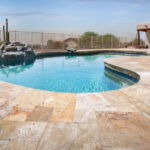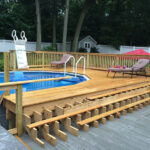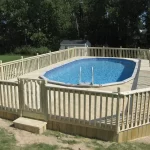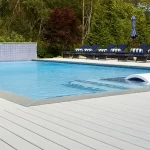Pool decks are an essential part of any backyard pool area. They not only provide a place for lounging and relaxation, but also serve as a safety measure to prevent slips and falls. Pool decks can be made from a variety of materials, including concrete, wood, and composite decking.
One popular choice for pool decks is concrete. Concrete is a durable and cost-effective option that can be customized in a variety of colors and finishes. It is also low-maintenance and can withstand harsh weather conditions. Concrete pool decks can be stamped, stained, or coated to create a unique and stylish look.
Wood is another popular choice for pool decks. Wood decks have a natural and rustic look that can complement any backyard setting. However, wood decks require regular maintenance to prevent warping, rotting, and fading. It is also important to choose a type of wood that is resistant to water damage, such as cedar or redwood.
Composite decking is a relatively new option for pool decks that combines the durability of plastic with the natural look of wood. Composite decking is low-maintenance, resistant to rot and fading, and comes in a variety of colors and textures. It is also eco-friendly, as it is made from recycled materials. However, composite decking can be more expensive than other options.
When designing a pool deck, it is important to consider the layout and functionality of the space. The size and shape of the pool deck should allow for easy access to the pool and provide enough room for lounging and seating areas. It is also important to choose materials that are slip-resistant to ensure the safety of swimmers.
Overall, pool decks are an important element of any backyard pool area. They not only provide a safe and functional space for lounging and relaxation, but also add style and personality to the outdoor environment. Whether you choose concrete, wood, or composite decking, investing in a well-designed pool deck can enhance the beauty and value of your home.
















